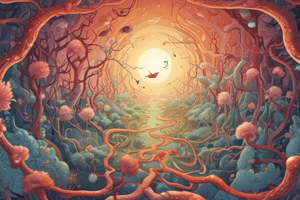Podcast
Questions and Answers
What does cell theory state about cells?
What does cell theory state about cells?
- All living things are composed of cells. (correct)
- Cells are the largest units of life.
- Cells contain no genetic information.
- Cells can exist independently of one another.
Which branch of biology focuses specifically on the study of microorganisms?
Which branch of biology focuses specifically on the study of microorganisms?
- Genetics
- Microbiology (correct)
- Molecular biology
- Zoology
What is the primary purpose of photosynthesis in plants?
What is the primary purpose of photosynthesis in plants?
- To release carbon dioxide as a waste product.
- To reproduce and create new cells.
- To convert light energy into chemical energy. (correct)
- To break down glucose into energy.
Which process is defined as the maintenance of a stable internal environment in an organism?
Which process is defined as the maintenance of a stable internal environment in an organism?
What role do genes play in living organisms?
What role do genes play in living organisms?
What key concept explains how populations of organisms change over time?
What key concept explains how populations of organisms change over time?
Which process involves breaking down glucose to release energy?
Which process involves breaking down glucose to release energy?
In which branch of biology would the study of plant life fall?
In which branch of biology would the study of plant life fall?
Flashcards
Biology
Biology
The study of life and living organisms, including their structure, processes, development, and evolution.
Cell
Cell
The basic unit of life; all living things are made up of cells.
Evolution
Evolution
The process by which organisms change over time, driven by factors like natural selection.
Homeostasis
Homeostasis
Signup and view all the flashcards
Metabolism
Metabolism
Signup and view all the flashcards
DNA
DNA
Signup and view all the flashcards
Photosynthesis
Photosynthesis
Signup and view all the flashcards
Respiration
Respiration
Signup and view all the flashcards
Study Notes
Topic Subtitle
- Biology is the natural science that studies life and living organisms, including their physical structure, chemical processes, molecular interactions, physiological mechanisms, development, and evolution.
- Biology examines a vast array of topics, from the structure of cells to the interactions within ecosystems.
Branches of Biology
- Cell biology: Studies the structure and function of cells.
- Genetics: Studies heredity and variation in organisms.
- Molecular biology: Studies biological processes at the molecular level.
- Microbiology: Studies microorganisms.
- Botany: Studies plants.
- Zoology: Studies animals.
- Ecology: Studies the interactions between organisms and their environment.
- Physiology: Studies the function of living organisms and their parts.
- Evolutionary biology: Studies the processes that have transformed life on Earth.
- Biochemistry: Studies the chemical processes in living organisms.
Key Concepts in Biology
- Cell theory: States that all living things are composed of cells. Cells are the basic units of structure and function in living things. Cells come from pre-existing cells.
- Evolution: The process by which populations of organisms change over time. Driven by mechanisms like natural selection, genetic drift, and gene flow. Key to understanding the diversity of life.
- Homeostasis: The maintenance of a stable internal environment in an organism. Essential for survival and function of cells, tissues, and organs.
- Metabolism: All chemical reactions that occur within an organism. Includes both catabolism (breaking down molecules) and anabolism (building up molecules). Fundamental to energy production and utilization.
- DNA: Deoxyribonucleic acid. Contains genetic information, and necessary for protein synthesis in all known organisms (except some viruses).
- Genes: Sections of DNA that encode for specific proteins.
Fundamental Processes
- Photosynthesis: Process by which plants and some other organisms use light energy to convert water and carbon dioxide into sugar (glucose).
- Respiration: Process by which organisms break down glucose to release energy. Aerobic respiration uses oxygen; anaerobic occurs without oxygen.
- Reproduction: The process by which organisms produce offspring. Can be sexual, involving two parents, or asexual, involving one parent.
- Growth and Development: Increase in size and complexity of an organism, proceeding via the precise interactions of molecular components and cellular activities.
- Adaptation: Inherited characteristic that enhances the survival and reproduction of an organism in specific environments. Shapes the diversity of life.
Levels of Biological Organization
- Organisms: Individual living things.
- Populations: Groups of individuals of the same species in a given area.
- Communities: All populations of different species in a given area.
- Ecosystems: All living organisms (biotic) in an area and their non-living environment (abiotic).
- Biosphere: All the ecosystems on Earth.
Studying That Suits You
Use AI to generate personalized quizzes and flashcards to suit your learning preferences.




